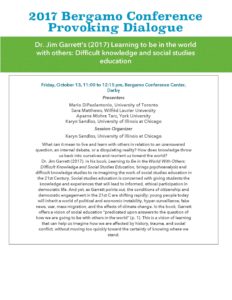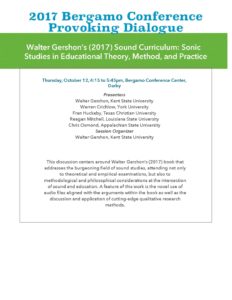Home » Articles posted by Jayna McQueen (Page 2)
Author Archives: Jayna McQueen
2019 Special Issue: The Curriculum of Disability Studies: Multiple Perspectives on Dis/Ability
Call for Papers
The Curriculum of Disability Studies: Multiple Perspectives on Dis/Ability
Journal of Curriculum Theorizing Special Issue
Guest Editors:
Jamie Buffington-Adams, PhD
Kelly Vaughan, PhD
In this special edition of the Journal for Curriculum Theory (JCT), we seek articles focused on The Curriculum of Dis/Ability Studies. Please note that we embrace a Disability Studies perspectives that dis/ability cannot be represented narrowly; therefore, we seek to highlight a multiplicity of voices (representing different experiences and academic fields) to address dis/ability in education and society. As such, we are calling for articles from those who identify as curriculum scholars, practitioners, and disability studies scholars. Strong submissions would draw from both the literature of Curriculum Studies and the literature of Disability Studies (and/or Disability Studies in Education).
Articles may address one of the questions below; however we will also consider pieces with other themes that draw from both Curriculum Studies[1] and Disability Studies[2].
- How do/could scholars bring a disability studies perspective to address the quintessential curriculum studies questions: What knowledge is of most worth? Who decides? Who benefits?
- How do/could educators in pre-K -16 spaces employ a disability studies perspective in their pedagogical and/or curricular approaches to education?
- How do/could scholars incorporate disability studies perspective in their work for social justice within schools?
Please note that we seek to compile seven to ten brief (five to seven page) articles for this special edition. Please submit your 2500 – 3500 word article to jabuffin@iue.edu by May 5, 2018. Please include a cover sheet with your biographical information, institutional affiliation, and contact information. Your article must include your theoretical framework, methodological approach, findings/themes, and significance. You article should not contain any identifying information.
You will be notified if your proposal was accepted by mid June, 2018.
Jamie Buffington-Adams
Assistant Professor
School of Education, Indiana University East
jabuffin@iue.edu
Kelly Vaughan
Assistant Professor
School of Education and Counseling, Purdue University Northwest
vaughak@pnw.edu
[1] We draw attention to the fact that JCT is “[h]istorically aligned with the “reconceptualist” movement in curriculum theorizing, and oriented toward informing and affecting classroom practice, JCT presents compelling pieces within forms that challenge disciplinary, genre, and textual boundaries.”
[2] Please note that we draw from the Disability Studies in Education SIG, which conceptualizes disability studies as a way “to promote the understanding of disability from a social model perspective drawing on social, cultural, historical, discursive, philosophical, literary, aesthetic, artistic, and other traditions to challenge medical, scientific, and psychological models of disability as they relate to education.” Disability Studies, as a field, is committed to social justice in schools and society. It is also important to note that the “interest, agendas, and voices of people labeled with disability/disabled people” are central. (http://www.aera.net/SIG143/Disability-Studies-in-Education-SIG-143)
2018 Special Issue: Curriculum Theorizing in The Post-Truth Era
Call for Papers
Curriculum Theorizing in The Post-Truth Era
Journal of Curriculum Theorizing Special Issue
Guest Editors:
Rouhollah Aghasaleh, PhD
Ligia (Licho) López López, PhD
The guest editors of Journal of Curriculum Theorizing invite article submissions for a special issue on Curriculum Theorizing in The Post-Truth Era. Submissions from established and new scholars are welcome. The special issue will be published in Spring 2019.
After the 2016 presidential election many scholars, institutions of higher education, and educators have released statements to support minoritized communities, immigrants, and other historically underserved groups. Several urban school districts reported a major drop in school attendance by Latinx and LGBTQI students who feel threatened and unsafe. The intensification of discourses and the performance of (what has been socially constructed as) racism, misogyny, xenophobia, and bigotry are unquestionable. How is education participating, resisting, refusing, and reinscribing these discourses and practices? During her concession speech, Clinton said the nation is “more deeply divided than we thought.” She was referring to a breakdown of the election results and the existing racial, gender, faith, class, and educational disparity. Education as a proxy of privilege is critical here. However, with Republicans controlling the executive, legislative, and judicial branches of the government, higher education will become even less accessible to populations living “in an alternative reality.” This makes public education more important and our work, as educators, even more critical. Some questions to ponder are: How do we teach those whose perspectives differ from us? What are the funds of knowledge of young people in Trumster families? What is the role of education in engaging with a large group of US citizens who relate to post-truth politics?
To this end, educators, students, curriculum scholars, and activists across the country have written on issues such as the problem of a “neutral” curriculum for education, the role of educators, social justice education, undocumented students, fake news, women’s lives, environmental justice, ethno-nationalims, school re-segregation, the clash of civilizations, and more.
This special issue will address questions such as:
- How did post-truth emerge and what were the conditions of its possibility?
- What is the place of curriculum theorizing in this post-truth politics era?
- How could professional organizations and scholars of education navigate the post-truth era?
- How do post-truth politics affect critical curriculum theory and practice?
- How can critical educators work with minoritized communities, immigrants, Black and Brown folx, Indigenous and first nation peoples, Muslims, and groups of marginalized students and their families?
- How could educators reach out to children of the Trumpsters in their classrooms? What are their funds of knowledge? And how would these inform the field of curriculum theorizing?
- How will social grassroots movements and issues that threaten immigrants, communities of color, LGBTQI communities, etc. inform public education in the post-truth era?
- Are there elements of the clash of civilizations thesis operating in generating the current states of affairs societies are seeing in and beyond the United States?
- What historical and philosophical means could be invoked to meditate and sit with in the present moment?
- What futurities might we see emerge from a persistent refusal of the orders that have come to normalize the violence inflicted on particular bodies?
* This special issue welcomes alternative formats such as, but not limited to, spoken word poetry, comics, arts-based approaches, essays in addition to more conventional research publications, working papers, theoretical pieces, and historical analysis.
Please, submit your 500-word abstract to jctposttruth@gmail.com by February, 28 2018.
Important Dates:
Abstracts Due: Feb. 28, 2018
Decision on Abstracts: Apr. 30, 2018
Full Manuscripts Due: Aug. 30, 2018
Publication: Spring, 2019
JCT: Journal of Curriculum Theorizing is an interdisciplinary journal of curriculum studies. It offers an academic forum for scholarly discussions of curriculum. Historically aligned with the “reconceptualist” movement in curriculum theorizing, and oriented toward informing and affecting classroom practice, JCT presents compelling pieces within forms that challenge disciplinary, genre, and textual boundaries.
The journal is published by the Foundation for Curriculum Theory and is associated with the Bergamo Conference on Curriculum Theory and Classroom Practice, held in the autumn of each year. JCT is indexed in The Education Index.
NOTICE: As of December 2008, the Journal of Curriculum Theorizing (Volume 24, Issue 1) and all future issues are available freely and exclusively online to all individuals and institutions.
Contributors to the Journal of Curriculum Theorizing retain copyright to their work. ISSN: 1942-2563
Rouhollah Aghasaleh, PhD
Department of Middle and Secondary Education, Georgia State University
Email: raghasaleh@gsu.edu
Ligia (Licho) López López, PhD
Melbourne Graduate School of Education, The University of Melbourne
Email: lllopez@unimelb.edu.au
Bergamo 2017 Program
Download the Full 2017 Bergamo Conference Program here:
We will not be providing printed programs at this year’s conference. Please arrange to bring a device with digital access to the conference program, or print out your own program prior to attending the conference.
See you soon at Bergamo!
The Bergamo Leadership Team


